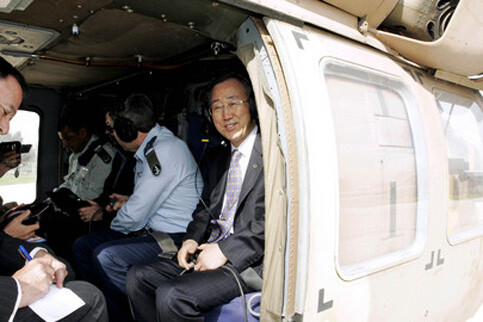The Electronic Intifada 7 December 2008

UN Secretary-General Ban Ki-moon takes a helicopter tour of Israel, March 2007. (Evan Schneider/UN)
UNITED NATIONS (IPS) - People in seven majority Muslim countries favor a more active United Nations with broader powers, while simultaneously viewing the world body as dominated by the US and failing to deal with the Israeli-Palestinian conflict, according to a new poll by WorldPublicOpinion.org, a global network of research centers.
The survey was conducted in Egypt, Turkey, Jordan, Iran, Indonesia, the Occupied Palestinian Territories and Azerbaijan. Nigeria, which has a 50 percent Muslim population, was also polled.
The survey found conflicted attitudes towards the UN. There was, however, clear support for a UN with much broader powers than it has today. Asked about a number of options for giving the UN greater powers, nearly all received strong support.
Steven Kull, director of WorldPublicOpinion.org, told IPS: “If we compare the results in Muslim-dominated countries to those in other regions, there is virtually consensus around the world on giving the UN more powers. This consensus is rather striking.”
“While many people in Muslim countries express disappointment with the UN, this actually masks their underlying desire for a UN that is robust and powerful,” Kull said.
An average of 64 percent of the people polled in all nations favored the UN Security Council having its own standing peacekeeping force. With 80 percent, Nigeria supported this idea the most, whereas Egypt was the most torn nation on this issue with 53 percent in favor of it and 47 percent opposing a standing force.
An average of 63 percent would like the Security Council to have the authority to go into countries to investigate human rights violations. Nigeria (79 percent) and Azerbaijan (77 percent) were the strongest supporters of this mandate, whereas Turkey (47 percent) was the weakest.
An average of 76 percent of all people polled want the Security Council to have the right to authorize military force to stop a country from supporting terrorist groups or to prevent severe human rights violations such as genocide (average 77 percent). There was, however, a wide perception in the nations polled that the UN is dominated by the US.
“One of the reasons for this may be the fact that the US used their veto to prevent resolutions of the Security Council dealing with Israel,” Kull noted.
In all but one nation, the most common view was that the “US basically controls the UN and can almost always make the UN do what the US wants,” as opposed to the view that “through its veto the US can stop the UN from doing things, but the US cannot make the UN do things the US wants.”
The view of the UN as controlled by the US was endorsed by 68 percent of Egyptians, 63 percent of Palestinians, 59 percent of Jordanians and 53 percent of Turks. In Indonesia, 43 percent agree, while 13 percent said the US can only stop the UN from doing things (44 percent did not answer). The only exception was Azerbaijan, where a plurality said the US can stop the UN from acting, but cannot make it do what the US wants (49 percent to 36 percent).
Respondents were also asked to assess a variety of UN efforts, rating them on a scale from zero, meaning “not all helpful,” to 10, meaning “extremely helpful.” Ratings were generally lukewarm at best, WorldPublicOpinion.org said.
The lowest ratings were for UN efforts “to resolve the Israel-Palestinian conflict.” The mean response was 3.7 with the lowest ratings coming from Jordanians (2.5) and Palestinians (2.6). Only Azerbaijanis were above 5 (5.3). Low ratings of UN performance on the Israel-Palestinian conflict are highly correlated with the perception that the US controls the UN.
Kull told IPS: “People would like the UN to resolve the problems. They are disappointed that it has not occurred.”
Also very low were ratings of UN efforts to resolve the conflict in Darfur. The mean rating was 3.8. The lowest ratings came from Jordanians (2.6), and the highest from Indonesians (5.3).
The most positive ratings were for the UN’s performance in providing humanitarian aid, ranging from 4.5 (Palestinians) to 7.8 (Indonesians), with a mean of 5.9. Nearly as high were UN peacekeeping operations, with a mean of 5.3, ranging from 3.5 (Palestinians) to 7.5 (Indonesians). UN efforts to address climate change received mixed reviews, with three nations above 5, three below 5 and a mean of 4.6.
WorldPublicOpinion.org is a project managed by the Programme on International Policy Attitudes at the University of Maryland. The survey was conducted in two waves over 12 January-18 February and 21 July-31 August 2008. Some 11,538 people participated. Margins of error range from +/-two to five percent. Not all questions were asked in all countries.
All rights reserved, IPS - Inter Press Service (2008). Total or partial publication, retransmission or sale forbidden.


